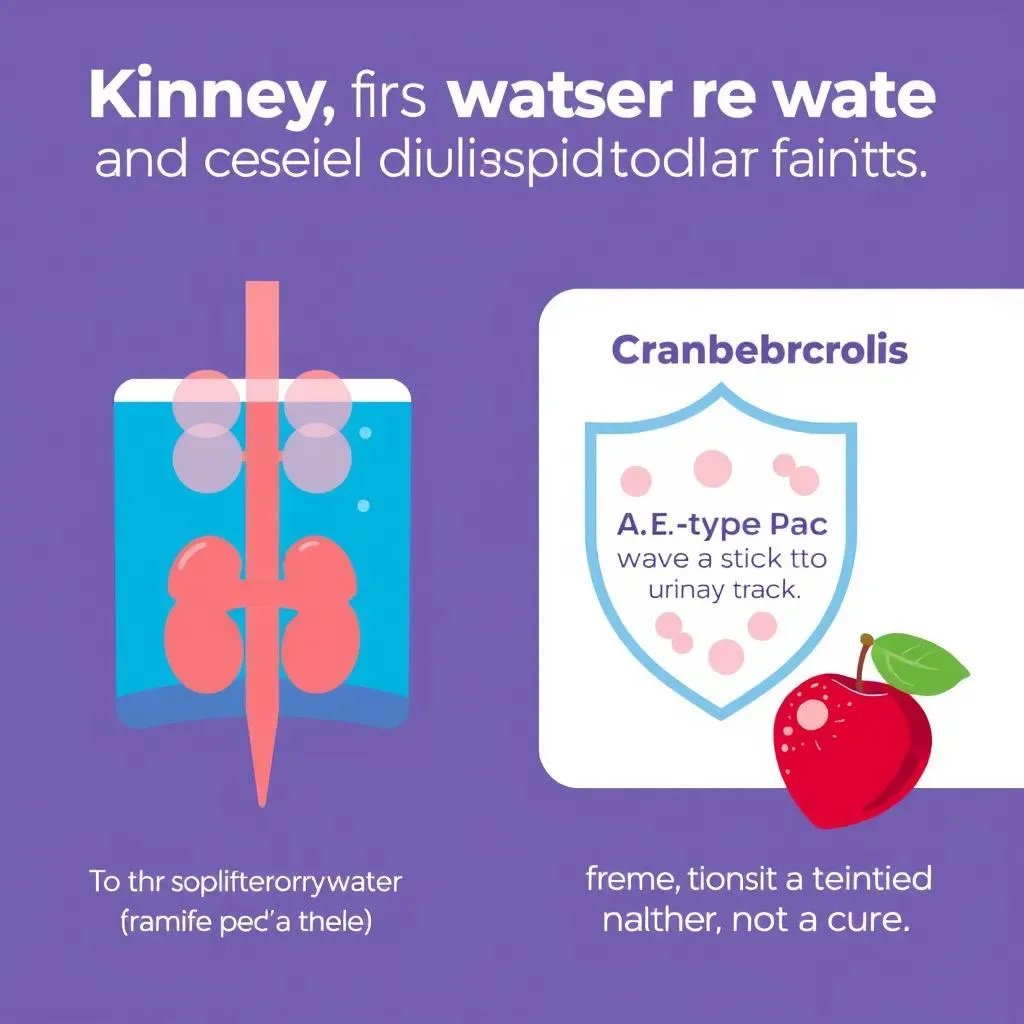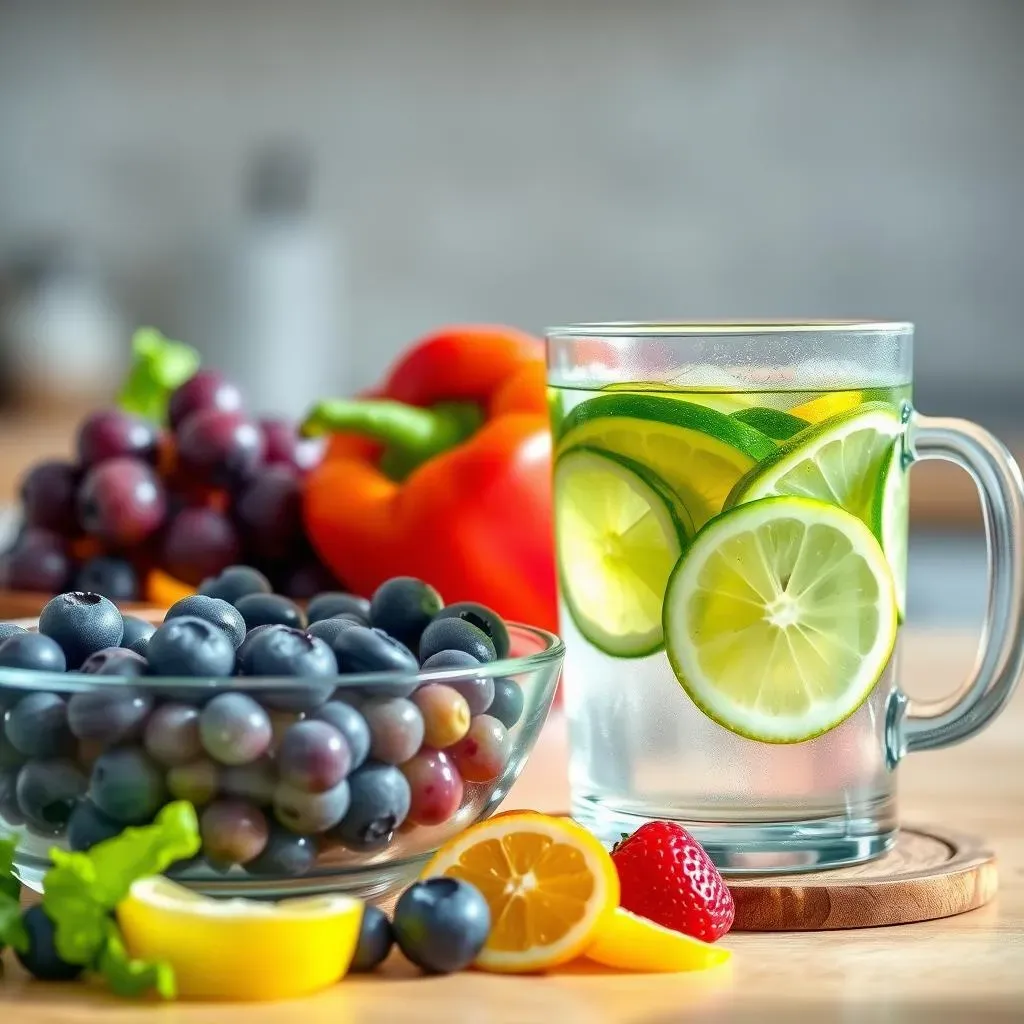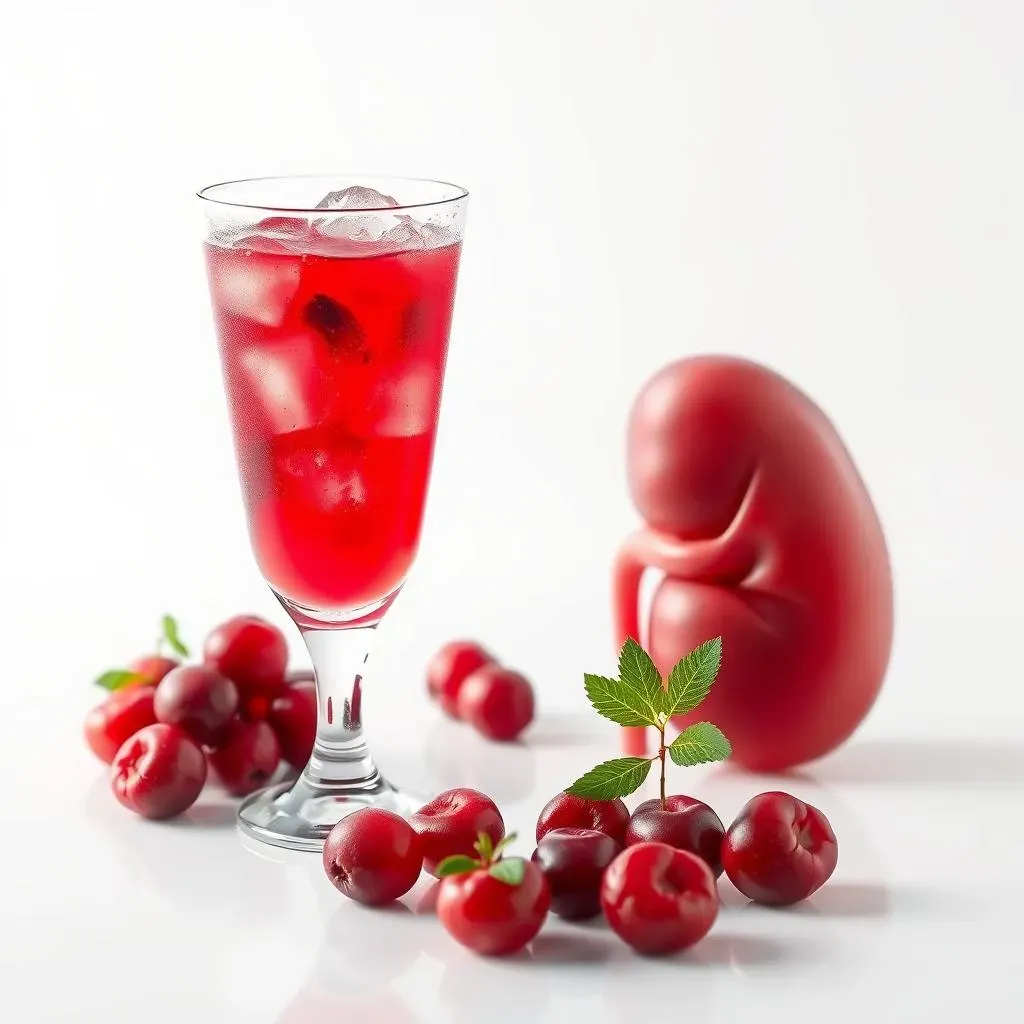Table of Contents
Are you exploring natural ways to keep your kidneys in top shape? You've likely stumbled upon the buzz around cranberry juice for kidney detox. But does this tart beverage truly live up to the hype? Our kidneys, those unsung heroes, tirelessly filter waste and balance electrolytes, playing a crucial role in overall health. In this article, we'll dive deep into the science behind cranberry juice and its potential effects on kidney function.
Debunking the Detox: Does Cranberry Juice Really Cleanse Your Kidneys?

Debunking the Detox: Does Cranberry Juice Really Cleanse Your Kidneys?
The "Detox" Dilemma
Let's be real, the word "detox" gets thrown around a lot these days. When it comes to cranberry juice, the idea is that it can flush out toxins and keep your kidneys sparkling clean. While cranberry juice *does* have some interesting properties, the whole "detox" concept is a bit misleading. Our kidneys and liver are already rockstars at detoxification. That's their main job! So, can cranberry juice give them a boost? Maybe, but not in the way you might think.
Think of it this way: your kidneys are like a sophisticated water treatment plant. They filter out waste, regulate fluids, and keep everything balanced. Cranberry juice isn't going to suddenly overhaul the system, but it might help with specific issues, which we'll get into. It’s more about support than a complete reset.
UTIs and Cranberry's Claim to Fame
The main reason cranberry juice gets linked to kidney health is its well-known ability to help prevent urinary tract infections (UTIs). UTIs can sometimes lead to kidney infections if left untreated, so there's a connection. Cranberries contain A-type proanthocyanidins (PACs), which can prevent bacteria, specifically E. coli, from sticking to the walls of your urinary tract. Less bacteria sticking around means a lower chance of infection. That said, it's more of a preventative measure than a cure if you already have a raging UTI. It's also worth noting that not all cranberry juice is created equal. You need a decent concentration of PACs to get the benefit, which often means opting for unsweetened or low-sugar varieties. Remember, sugar can actually feed bacteria!
Also, while cranberry juice might help prevent bacteria from sticking, it doesn't actually "kill" the bacteria. And if the bacteria has already formed a strong foothold, cranberry juice might not be enough. So, think of it as a shield, not a sword.
Benefit | Details | Important Note |
|---|---|---|
UTI Prevention | A-type PACs prevent bacteria from sticking to urinary tract walls. | Best for prevention, not a cure. Choose low-sugar options. |
Hydration | Contributes to overall fluid intake, supporting kidney function. | Water is still the best choice for hydration. |
The Science of Cranberries: How Cranberry Juice Impacts Kidney Health

The Science of Cranberries: How Cranberry Juice Impacts Kidney Health
Digging Deeper: Beyond the PACs
so we know PACs are the star of the show when it comes to preventing UTIs, but what else is going on inside those little red berries? Cranberries are packed with antioxidants, like quercetin and myricetin, which can help combat inflammation. Now, chronic inflammation is linked to all sorts of health problems, including kidney disease. By reducing inflammation, these antioxidants *could* indirectly support kidney health. However, research is still ongoing to fully understand the extent of this benefit.
Also, cranberries contain Vitamin C, which is an immune system booster. A strong immune system is always a good thing when it comes to fighting off infections that could potentially impact the kidneys. But remember, Vitamin C is abundant in many fruits and vegetables, so cranberries aren't the only way to get your fix.
The Oxalate Question: A Potential Downside?
Here's where things get a bit tricky. Cranberries are relatively high in oxalates, which are naturally occurring compounds found in many foods. In some people, oxalates can contribute to the formation of kidney stones, particularly calcium oxalate stones. If you're prone to kidney stones, especially this type, chugging cranberry juice all day might not be the best idea. It's always a good idea to chat with your doctor or a registered dietitian about your specific situation. They can help you determine if cranberry juice is a good fit for your kidney health, considering your personal history and risk factors.
It's also important to note that not everyone is equally susceptible to oxalate-related issues. Some people can process oxalates without any problems, while others are more sensitive. Factors like genetics, gut health, and hydration levels can all play a role. So, what might be a helpful preventative measure for one person could potentially be problematic for another.
The Hydration Factor: Don't Forget the Water!
While cranberry juice itself might have some potential benefits, let's not forget the importance of hydration. Drinking plenty of fluids is crucial for kidney health, as it helps flush out waste and prevent the formation of kidney stones. Cranberry juice can contribute to your overall fluid intake, but it shouldn't be your only source of hydration. Water is still the king (or queen!) when it comes to keeping your kidneys happy. Aim for at least eight glasses of water a day, and consider adding cranberry juice as an occasional supplement, not a replacement.
Also, be mindful of the sugar content in some cranberry juice varieties. Excess sugar can actually be detrimental to your health, potentially contributing to insulin resistance and other issues that could indirectly impact kidney function. Opt for unsweetened or low-sugar options whenever possible. You can always add a splash of cranberry juice to water for a hint of flavor without the added sugar.
Factor | Impact on Kidney Health | Considerations |
|---|---|---|
Antioxidants | May reduce inflammation, potentially supporting kidney function. | Research is ongoing to fully understand the extent of the benefit. |
Oxalates | May contribute to kidney stone formation in susceptible individuals. | Consult with a doctor if you have a history of kidney stones. |
Hydration | Contributes to overall fluid intake, crucial for kidney function. | Water should be the primary source of hydration. |
Beyond Cranberry Juice: Natural Ways to Support Kidney Detox at Home

Beyond Cranberry Juice: Natural Ways to Support Kidney Detox at Home
Hydration is Still King: Water, Water, Everywhere
so cranberry juice has its nuances, but let's circle back to the most fundamental aspect of kidney health: hydration. Seriously, I can't stress this enough. Water is the lifeblood of your kidneys, helping them efficiently filter waste and maintain that delicate electrolyte balance. Forget fancy detox potions; plain old H2O is your best friend. Aim for a steady intake throughout the day, not just when you're thirsty. Keep a water bottle handy, set reminders on your phone, whatever it takes to make hydration a habit. And listen to your body! If your urine is dark yellow, you're probably not drinking enough.
Here's a fun fact: thirst is often mistaken for hunger. So, next time you feel a pang, try drinking a glass of water first. You might be surprised! And if you're not a fan of plain water, jazz it up with slices of cucumber, lemon, or lime. Infused water is a delicious and refreshing way to stay hydrated without added sugar or artificial sweeteners.
Dietary Powerhouses: Fueling Kidney Function with Food
Beyond hydration, your diet plays a massive role in kidney health. Think of your kidneys as tiny, hardworking engines. They need the right fuel to function optimally. That means loading up on kidney-friendly foods and limiting the stuff that can put extra stress on them. Focus on a heart-healthy diet rich in fruits, vegetables, and lean proteins. These foods provide essential vitamins, minerals, and antioxidants that support overall kidney function. And don't forget fiber! Fiber helps regulate blood sugar levels and promotes healthy digestion, both of which are important for kidney health.
Specific foods that are particularly beneficial for kidney health include grapes (resveratrol!), blueberries (antioxidants!), and bell peppers (Vitamin C!). On the flip side, try to limit processed foods, sugary drinks, and excessive amounts of red meat. These can contribute to inflammation and put extra strain on your kidneys. It's all about balance and making conscious choices that support your long-term health.
Food Group | Examples | Benefits |
|---|---|---|
Fruits | Grapes, blueberries, cranberries (in moderation), apples | Antioxidants, vitamins, fiber |
Vegetables | Bell peppers, cabbage, cauliflower, garlic, onions | Vitamins, minerals, fiber, anti-inflammatory compounds |
Lean Proteins | Fish, poultry, beans, lentils | Essential amino acids, supports muscle function |
Herbal Allies: Teas That Support Kidney Health
Did you know that certain herbal teas can also lend a helping hand to your kidneys? Green tea, for example, is packed with antioxidants and has been shown to have protective effects on kidney cells. Dandelion tea is another popular choice, as it acts as a natural diuretic, helping to flush out excess fluids and toxins. And ginger tea is known for its anti-inflammatory properties, which can be beneficial for overall kidney health. Just be sure to choose caffeine-free options, as excessive caffeine can actually dehydrate you.
It's important to note that herbal teas are not a substitute for medical treatment. If you have any underlying kidney conditions, always consult with your doctor before adding herbal teas to your routine. And remember, moderation is key. Drinking excessive amounts of any tea can potentially have negative effects. Start with one or two cups a day and see how your body responds.
Cranberry Juice for Kidney Detox: Dosage, Risks, and What to Expect

Cranberry Juice for Kidney Detox: Dosage, Risks, and What to Expect
Finding Your Sweet Spot: Recommended Cranberry Juice Dosage
Alright, so you're thinking about adding cranberry juice to your routine. Great! But how much should you actually drink? There's no one-size-fits-all answer, but a good starting point is around 4 to 8 ounces of unsweetened cranberry juice per day. It's best to spread this out throughout the day rather than chugging it all at once. And remember, we're talking about *unsweetened* juice here. The added sugar in many commercial varieties can negate any potential benefits and even be harmful in the long run. If you find unsweetened juice too tart, try diluting it with water or adding a squeeze of lemon or lime.
Also, keep in mind that cranberry supplements, like capsules or tablets, are also available. These can be a good option if you don't like the taste of cranberry juice or want a more concentrated dose of PACs. However, it's important to choose a reputable brand and follow the dosage instructions carefully. And as always, chat with your doctor or a registered dietitian before starting any new supplement regimen.
Navigating the Not-So-Sweet Side: Potential Risks and Side Effects
Like anything, cranberry juice isn't without its potential downsides. We've already touched on the oxalate issue, which can be a concern for people prone to kidney stones. But there are a few other things to keep in mind as well. Cranberry juice is fairly acidic, which can erode tooth enamel over time. So, it's a good idea to rinse your mouth with water after drinking it. Also, some people may experience digestive upset, like diarrhea or stomach cramps, if they consume too much cranberry juice. Start with a small amount and gradually increase it as tolerated.
Furthermore, cranberry juice can interact with certain medications, particularly blood thinners like warfarin. If you're taking any medications, it's crucial to talk to your doctor before adding cranberry juice to your diet. They can help you determine if there are any potential interactions and adjust your dosage accordingly. Safety first!
Setting Realistic Expectations: What Can You Really Expect?
Let's be honest: cranberry juice isn't a magic bullet for kidney health. It's not going to reverse existing kidney damage or cure kidney disease. But it *can* be a helpful tool in your arsenal for supporting overall kidney function and preventing UTIs. The key is to have realistic expectations and use it as part of a comprehensive approach that includes a healthy diet, adequate hydration, and regular exercise. Think of it as one piece of the puzzle, not the entire picture.
So, what can you realistically expect? If you're prone to UTIs, cranberry juice might help reduce the frequency of infections. It can also contribute to your overall fluid intake, which is always a good thing for kidney health. And the antioxidants in cranberries might offer some additional benefits. But remember, results may vary, and what works for one person might not work for another. Pay attention to your body, listen to your doctor, and make informed decisions based on your individual needs and circumstances.
The Final Sip: Cranberry Juice and Your Kidney Health
So, where does that leave us with cranberry juice and kidney detox? While cranberry juice may offer some benefits in preventing UTIs, its direct impact on kidney detoxification is not strongly supported by scientific evidence. A balanced approach, focusing on adequate hydration, a kidney-friendly diet, and healthy lifestyle choices, remains the cornerstone of good kidney health. If you have concerns about your kidney function or are considering a cleanse, consulting a healthcare professional is always the best course of action. They can provide personalized advice tailored to your specific needs and medical history. Remember, when it comes to your health, informed decisions are the most powerful ones you can make.